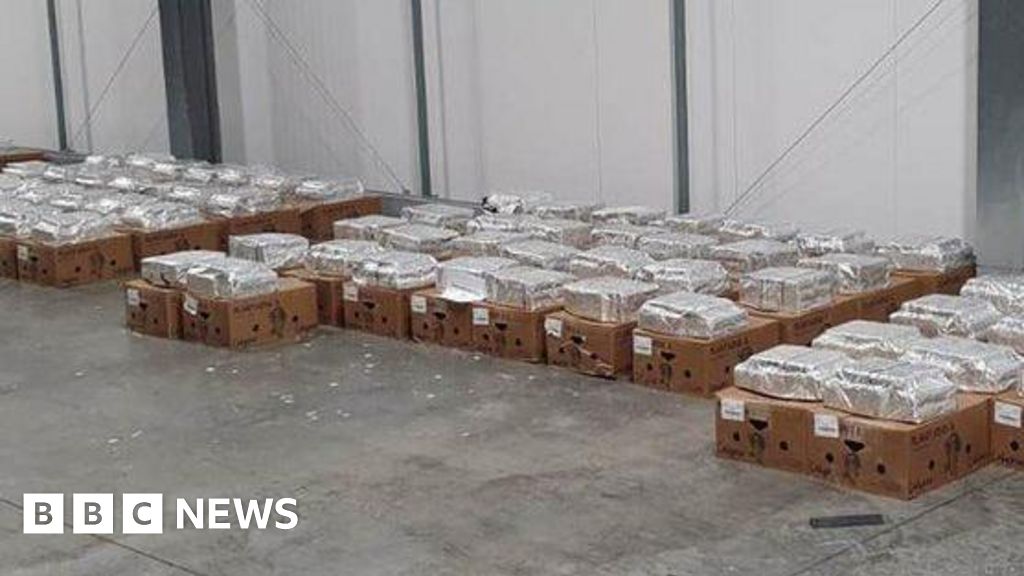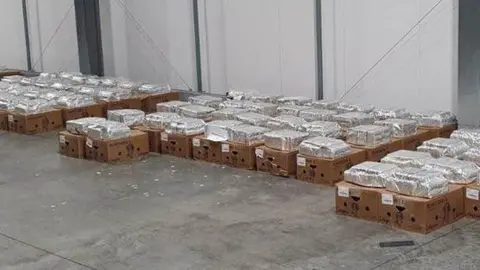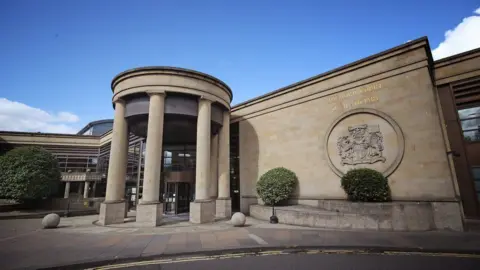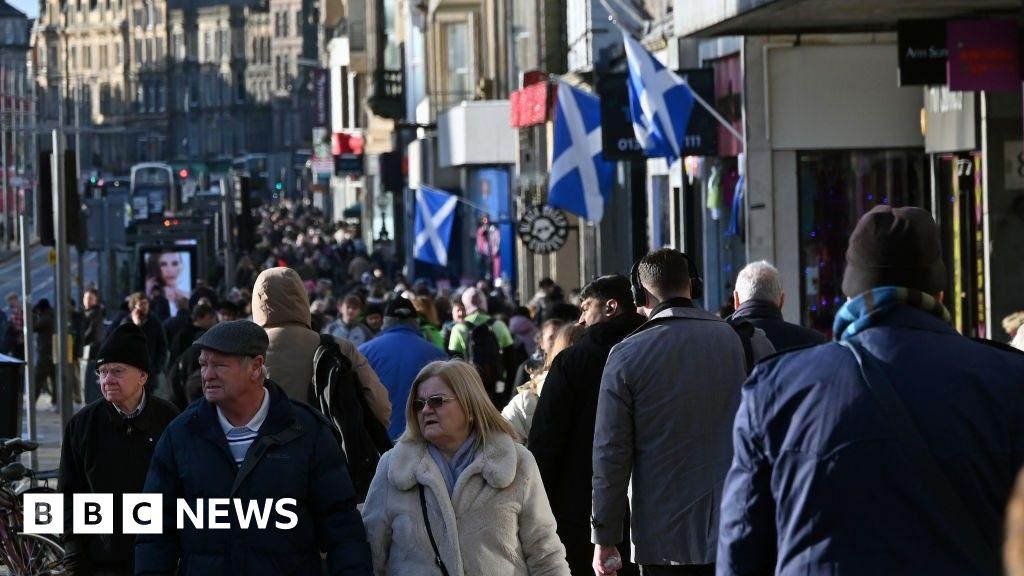Bussiness
Three-day search found cocaine in banana boxes, court told

 NCA
NCAA senior crime officer has told a trial it took three days to search nearly a tonne of cocaine hidden in a banana box shipment from South America.
Border Force officials searched a cargo of the fruit which had arrived at Dover from Ecuador and was addressed to a business in Glasgow.
They discovered 119 foil packages containing 952 kilogrammes of cocaine with a purity level of 73%.
Six men are on trial at the High Court in Glasgow charged with a series of drugs offences.
James Stevenson, 59, is accused of heading up the drug trafficking operation which spanned the UK, Spain, Ecuador and the luxury Nurai Island resort in Abu Dhabi.
Prosecutors have listed 14 charges in a seven page indictment of accusations which span between January and September 2020.
They include claims Stevenson allegedly ordered Lloyd Cross, David Bilsland, and unnamed others to commit “a serious offence” by importing and supplying cocaine.
Michael Miller, a senior officer at the National Crime Agency, told jurors that the cocaine had been brought to the UK from mainland Europe in HGVs or boats from South America.
The banana shipment was addressed to “Glasgow Fruit Market” in the city’s Townhead.
Criminal money is said to have funded the set-up, including purchasing equipment, leasing premises, buying cars and registering company directors under fake names.
‘Premium bananas’
Mr Miller and a team of Scottish officers analysed the boxes at a Home Office location in the south of England over three days.
Jurors were shown images of the boxes marked with the Calypso brand as well as pictures of green bananas inside.
The boxes had a label stating that they were being exported by “Ernati” as well as a description of “premium bananas” which were “imported by Glasgow Fruit Market Limited.”
Mr Miller explained that within 40 individual packages, there were eight blocks weighing one kilo each which they nicknamed “bags of sugar.”
The witness told Tony Graham KC, representing co-accused Gary McIntyre, that packages have been known to have false names on them or the address written on the label to be for next door.
 PA Media
PA MediaThe court was also told that in 2020, police raided David Bilsland’s fruit merchant business on a Glasgow industrial estate.
One of his associates, a refrigeration engineer, saw the officers and later asked Mr Bilsland what had happened.
In a statement to police later that year, Andrew Wilson said of Mr Bilsland: “He was looking terrible. He looked as if he had seen a ghost and he was a broken man.
“He’s normally upbeat and bubbly. I have never seen him like that. He was about to start crying.”
“He told me that he had done something stupid and he’s put his hands up to it and that he’s going to jail for a long time and the police had arrested him.”
Mr Wilson said drugs were mentioned.
Under cross examination by the defence, he agreed the court couldn’t rely on every word in the statement being accurate.
The trial also head from Wayne Johns, senior manager at the NCA, who told jurors about encrypted EncroChat mobile devices which were discovered by French law enforcement in April 2020.
Operation Venetic, a UK-wide crackdown on organised crime, investigated the information from the encrypted network passed to the NCA by the French.
Prosecutor Alex Prentice KC asked: “In all the work you did, have you come across at anytime a legitimate business using EncroChat?”
Mr Johns replied that he had not, and said that people could buy the devices from re-sellers for between £1,200 and £1,500.
He said the phones could be wiped by turning them off or by creating a “Panic Password” and identities on the network were anonymised with usernames in their place.
But Thomas Ross KC, defending Stevenson, raised concerns over the reliability of the data recovered as French authorities had not revealed the software used to access the EncroChat servers.
Mr Johns said: “We went back to get further details but it was protected by French national security.”
Encrypted communication devices
Stevenson is also accused of a number of other charges, including an allegation that he teamed up with another man for the “collection, storage and onward transmission” of £1.04m of criminal funds.
This was apparently helped with the use of “encrypted communication devices”.
One charge states Stevenson, Bilsland and McIntyre were involved in “serious organised crime”.
The three face a separate charge under the Custom and Excise Management Act of being involved in the importation of controlled drugs.
The indictment further claims the trio were concerned in the supply of cocaine.
Stevenson and Gerard Carbin, 45, are said to have directed Paul Bowes, 53, Ryan McPhee, 34, and another individual to take part in the production and supply of street Valium and the tranquilliser Alprazolam.
A further charge claims Stevenson was involved in serious organised crime with a person now said to be in prison.
This is said to have involved the collection, adulteration and supply of cocaine.
The indictment also states encrypted communication devices were used and “concealed hides” in cars for moving drugs.
The final charge claims Stevenson conspired with others to set fire to a number of properties and cars including a beauty salon in Hamilton, Lanarkshire.
A further special defence of incrimination was lodged by Stevenson against James White, John Gurie and Stephen Jamieson whose present whereabouts are unknown.
The trial continues before Judge Lord Ericht.











